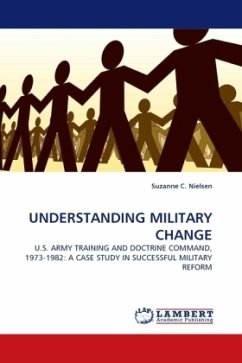In the 1970s, the U.S. Army Training and Doctrine Command (TRADOC) played a key role in instituting and integrating military reforms. TRADOC updated doctrine, revised training practices, and ensured that these and other changes were mutually reinforcing. TRADOC changed the manner in which the U.S. Army prepared for war. That TRADOC played such a central role is important because a common expectation is that military organizations are unable to reform themselves. This perspective fails to predict the changes that Generals William DePuy, Donn Starry, and Paul Gorman spearheaded in the 1970s and early 1980s. The Army faced external pressures, but these challenges and constraints did not provide Army leaders with a detailed plan of action. The shape and extent of reforms in the U.S. Army in the 1970s were primarily determined by leaders from within the organization.








